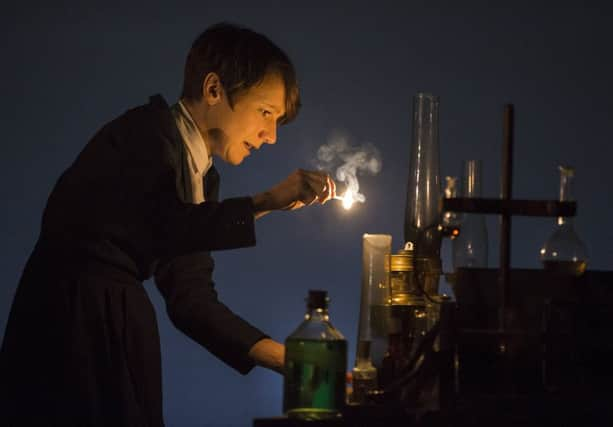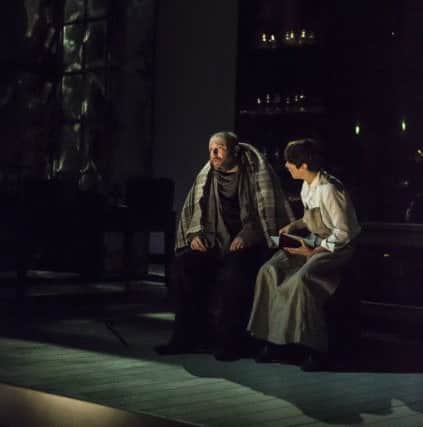How Frankenstein got recast as a woman


Frankenstein: the extraordinary story that has much to tell us about Brexit, the state of the NHS and the social conditions of 2017.
Surprised? Don’t be.
When Mary Shelley wrote Frankenstein in 1818, she was still a teenager.


Advertisement
Hide AdAdvertisement
Hide AdThe story has reverberated down the ages and now yet another telling of the Frankenstein legend is coming to the stage, this time courtesy of director Lorne Campbell and writer Selma Dimitrijevic.
When the production comes to Sheffield Crucible next week, audiences will be treated to a myth that has become one of the most enduring stories of modern literature and something that still has plenty to say two centuries after it was written.
It will also feature one significant change to the traditional story: the Doctor and creator of the monster is not Victor, but Victoria Frankenstein.
It’s all part of Campbell’s production having much to say to contemporary audiences.


Advertisement
Hide AdAdvertisement
Hide Ad“It is absolutely relevant – perhaps now more than ever,” he says. “You can read it in so many ways – one of the themes is about how capable we are of doing the most remarkable things, but we are also so bad at looking into the long term future and working out the consequences of our actions.
“If we do this thing, how do we take responsibility for everything else that flows from that? The novel isn’t saying that progress is bad, it says if you do these things, then you carry a heavy responsibility, especially if you don’t deal with the consequences.
“It can be applied to so much of what we see happening in the world today, from the refugee crisis to global warming to the Middle East. Starting things is easy and exciting. Seeing things through is harder and much more complicated.”
The remarkable story of the creation of Frankenstein or, The Modern Prometheus, to give the novel its full title is almost as remarkable as the story itself.
Advertisement
Hide AdAdvertisement
Hide AdMary Wollstonecraft Shelley was 18 years old when she first came up with the story that would continue to fascinate 200 years later. Most will know that Shelley was in Geneva during the summer when she first came up with the idea for Frankenstein. Famously she, her soon to be husband Percy Shelley and Lord Byron spent a summer at Lake Geneva and it was a contest to come up with a ghost story that led to the birth of Frankenstein.
Campbell’s research into the play has revealed a fascinating detail about that summer.
“It was this very odd year where there had been a huge volcanic eruption in the Philippines, which essentially meant there was no summer that year because of an enormous ash cloud all over Europe. There they were around Lake Geneva in summer and it was snowing. They were living in this gloomy, gothic world where summer never came and that was when they came up with the competition to write ghost stories. You can really feel that, I think, the fact that this story was born out of this incredible intensity.”
It goes some way to explaining the power of a story that we are still hungry to hear. From Danny Boyle’s staging at the National Theatre, to literally scores of film portrayals from Boris Karloff onwards, the legend of Frankenstein seems destined to live for eternity.
Advertisement
Hide AdAdvertisement
Hide AdAs the artistic director of Newcastle’s Northern Stage theatre, Campbell takes seriously his responsibility to represent all of society, which is one of the reasons that in his production the creator of the creature is a woman.
Played by Polly Frame, Victoria Frankenstein is the woman who reanimates the corpse in this latest production. “It’s not the subject of the play that our Frankenstein is a woman, it’s the context of it,” he says. “It reflects Shelley: she is this highly driven, passionate, intelligent woman who is living in a world that isn’t ready for her to be any of those things.
“There is a big and ongoing conversation in theatre about proper representation. We are getting better, but we have a long way to go. When you look at classical texts in particular, the centre of the play tends to be a male character and that male represents mankind. There is no reason why a woman can’t fulfil that role.
“I believe in great art and entertainment standing hand in hand and having diversity is in no way a barrier to that. If anything it’s an engine that drives it.”
Advertisement
Hide AdAdvertisement
Hide AdThe final question is the fact that Campbell follows so many other tellings of this story. When you have so much behind you, how do you look forward and breathe life into your own adaptation in 2017?
“I actually find it quite liberating,” he says. “When you have a story that has been told in so many different ways it feels like you are speaking into this really broad palette. The two big decisions we have made which I think feel fresh and original are the idea of Victoria, but also the nature of the creature. In our production the creature isn’t ten bits of bodies sewn together, he’s one man who has died and is then brought back to life.
“In that way he doesn’t belong to any society, he’s an outsider raised cruelly by a society that takes no responsibility for him. For me that makes our creature the morality of the play. It’s often said that society is judged by how it treats its weakest and most vulnerable and that is the huge question that we face today, it sits at the heart of Brexit, of the situation with the NHS, it sits at the heart of our political and social world which is why I think there is something very urgent and powerful that this play has to say to us today.”